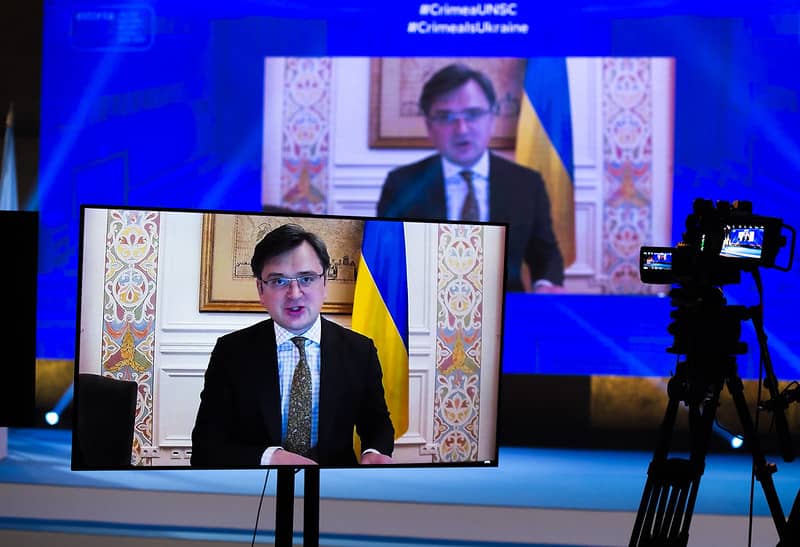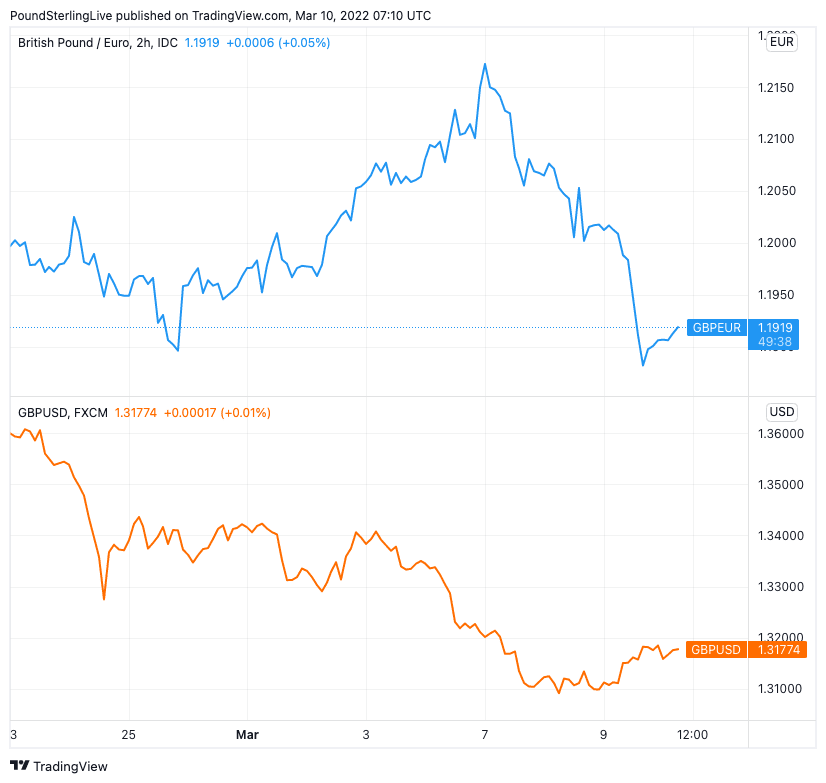Pound Reacts to News Peace Talks Have Ended with Little Progress
- Written by: Gary Howes
- Ukraine, Russia find no agreement following talks in Turkey
- The war continues and sentiment is in flux
- Economists warn of potential for global recession
- This typically benefits USD

Above: File image of Ukraine Minister of Foreign Affairs, H.E Mr Dmytro Kuleba. Image: Estonian Foreign Ministry. Source: Flickr. Licensing: Creative Commons 2.0.
The British Pound is in flux again as global investor sentiment softens once again, this time as peace talks between Russia and Ukraine fail to deliver supportive headlines.
Ukrainian Foreign Minister Dmytro Kuleba said the list of demands made by Russia in order to cease its invasion amounts to a surrender.
The assessment follows a meeting between him and Russian Foreign Minister Sergei Lavrov in Turkey's Antalya.
The Pound is looking firmer against the Euro following three days of sharp declines amidst improved investor sentiment.
The UK currency is however looking softer against the Dollar which appreciated in value following the outbreak of war.
Should sentiment deteriorate further then the Pound and Euro would potentially lose value to the Dollar, as has been the dominant trends since the war started. However, the Pound could begin to climb against the Euro again.
Above: GBP/EUR (top) and GBP/USD (bottom) price action since Russia's invasion of Ukraine.
Market sentiment improved ahead of the talks after Ukraine President Volodymyr Zelensky said in an interview with Germany's Bild Newspaper he is prepared for certain compromises, but that Russia must also compromise.
For their part Russia has also expressed the desire to see a negotiated settlement.
These comments came on a day that European and global markets surged and oil prices slumped, easing pressure on the Euro and other European currencies.
The Pound to Euro exchange rate slid below 1.1879 at one stage, delivering a blow to Sterling holders who were holding out for levels closer to 1.22 just three days ago.
(Get a quote with our partners at Global Reach, they can also provide their expertise to help you time your payment, thereby saving you potentially thousands of Pounds. More details here * this is an advertisement).
The Pound to Dollar exchange rate meanwhile recovered to 1.3180, having been as low as 1.3081 on Tuesday.
Volatility will likely remain elevated as the prospect of a near-term breakthrough doesn't look likely.
For its part Russia wants Ukraine to commit to being a neutral country in the future while acknowledging the independence of two break away Donbass regions. They also want Kyiv to acknowledge their claim on Crimea, which they took in the 2014 invasion.
But Ukraine says it won't cede an inch of ground to Russia, highlighting that the odds of a breakthrough being reached today are slim.
While markets have shown a more confident tone this week the overarching themes that sent them lower remain: there is a major conflict underway and commodity and inflation are surging, increasing the prospects of a global recession.
A global growth slowdown would be expected to support the U.S. Dollar which is an anti-cyclical currency by nature.
{wbamp-hide start}
{wbamp-hide end}{wbamp-show start}{wbamp-show end}
"Inflation is moving even higher as we see with sharp increases in commodity prices. There is only one cure to it in the short term. As long as supply is reduced, demand has to come down. Otherwise there will continue to be too much demand relative to supply. That may very well require a recession in demand - and thus in the whole economy," says Allan von Mehren, Chief Analyst at Danske Bank.
"We currently have significant headwinds to global growth that has increased the risk of recession significantly, especially in Europe," he adds.
But the Euro was better supported this week amidst talk that EU leaders might agree the formation of a joint bond to finance increased defence spending and ease the impact of the energy crisis.
"EU officials have shown some appetite for further supranational bond issuance in order to support energy and defence spending. Although the details remain unclear, the signal that the fiscal taps are set to loosen has provided the euro with enough steam to drive off from recent lows," says Simon Harvey, Head of FX Analysis at Monex.
The European Council meets today in Versailles, France for talks and more details on the matter might become known.
- Reference rates at article's last update:
- GBP/EUR: 1.1920 \ GBP/USD: 1.3180
- High street bank rates (indicative): 1.1687 \ 1.2910
- Payment specialist rates (indicative): 1.1860 \ 1.3113
- Find out more about specialist rates and service, here
- Set up an exchange rate alert, here
EU nations have in the past struggled to find common ground quickly when agreeing to issuing joint bonds (think of the pandemic response bond), and it could therefore prove to be a dragged out affair.
"The recent flurry of euro strength may prove temporary as fiscal plans may become mired in bureaucracy," says Harvey.
Stock markets will remain a bellwether of investor sentiment and determinant of foreign exchange market flows: further rallies will aid the EUR/USD and EUR/GBP higher, as well as the GBP/USD.
But expect the opposite to be true if the recent relief in sentiment ends and stocks revert to medium-term downtrends.
"The outlook for the EUR appears binary at this juncture, in our view. A continuation of the Ukraine conflict should see EUR underperform the G10 commodity currencies and safe havens. However, a resolution would bring upside risks," says Barclays. "Eurozone is particularly exposed to the conflict due to its energy dependence on Russia as well as financial and trade flows."
Christian Stocker, Lead Equity Sector Strategist, UniCredit Bank, Munich, says he expects to see a lot of strong stock market fluctuation in both directions over coming weeks that could extend volatility into currencies.
"We think the consequences and structural changes of the current crisis are likely to continue to have an impact for some time. Therefore, it is unlikely that stock markets will achieve an immediate V-shaped recovery like that which occurred in 2020," says Mehren.
With many Russian commodity exports effectively cut off from global markets upward pressure on inflation will likely continue, requiring new supply chains and routes to be established.
This takes time.
"Companies, and therefore stock markets, are facing a lengthy period of adjustment with considerable uncertainty and most likely higher costs," says Mehren.
"This argues against a rapid return to sustained higher valuations and it may take some time before the stock market starts to recover," he adds.






